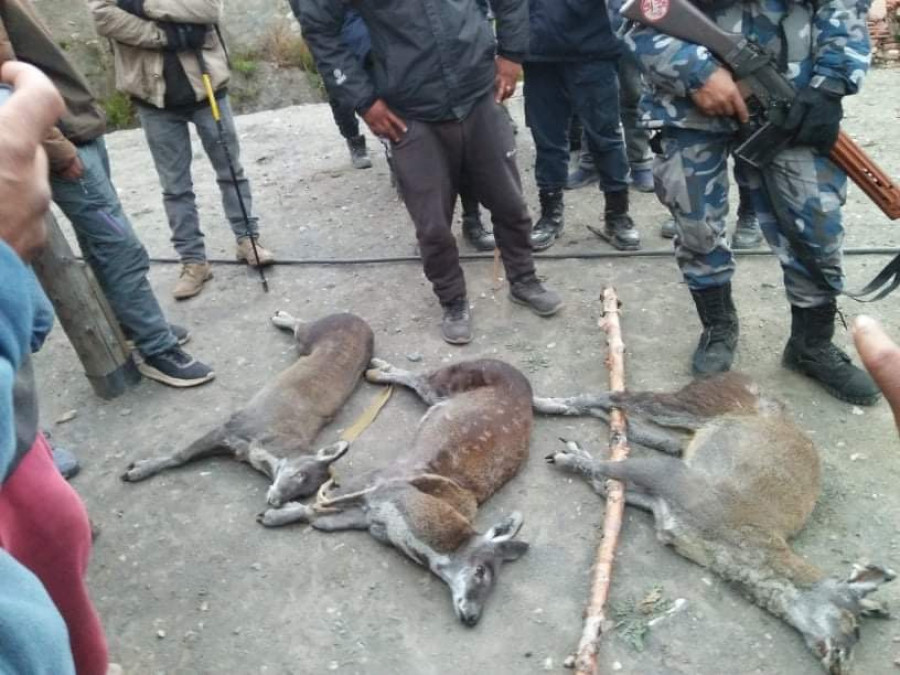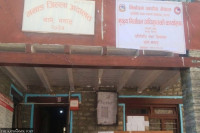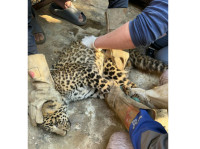Gandaki Province
Poaching and smuggling of musk deer on rise in Mustang forests
Five musk deer were found dead in snares in the last 10 days in the Annapurna Conservation Area Project region.
Ghanshyam Khadka
Conservationists and security personnel are worried about the unchecked poaching and smuggling of musk deer (Moschus chrysogaster), locally known as Kasturi Mriga, in the forests of Annapurna Conservation Area Project (ACAP) in Mustang district.
The ACAP and the District Police Office in Mustang have launched a security campaign after they were informed about the unchecked smuggling of deer scent glands in Bahragaun-Muktinath Rural Municipality-1 two weeks ago. Employees at the ACAP and security personnel have been patrolling several forests in the area for the past 10 days to prevent poaching incidents.
“Five musk deer were found dead in snares. During the patrolling, we recovered as many as 171 snares planted to trap wild animals, mainly musk deer. The discovery of such a large number of traps shows that wildlife poaching and smuggling of their body parts have picked up pace in the area,” said Rishi Baral, chief at ACAP Area Office in Jomsom.
According to Baral, this is the first time that such a large number of snares and dead musk deer have been recovered from the ACAP.
“It is not possible to plant so many traps and smuggle the body parts of wildlife without the involvement of local hunters. A detailed investigation is underway and we will hopefully get some answers,” he said.
Among the dead musk deer the patrol team recovered, two were male and three were female. The smugglers had removed the scent gland of the two male musk deer. The patrol also found a female musk deer trapped in one of the snares.
“We rescued the deer and released it in the forest later,” said Baral. According to him, two jackals were also found dead in the snares.
The musk deer is on the endangered list of the International Union for Conservation of Nature. The animal is valued for the scent glands, known to have medicinal properties, found in the male species.
“The district police, in coordination with the ACAP, have started patrolling the forests after receiving information that poachers and smugglers were scouting the Lupra and Khampa areas for musk deer. We handed over the dead animals to the ACAP for investigation and removed the discovered snares,” said Aashish Adhikari, inspector at the District Police Office.
“Although the ACAP is responsible for the conservation of wildlife, the police administration is also investigating the poaching incidents, as an increasing number of smuggling cases has been reported in recent days,” said Adhikari.
Nepal Army personnel, ACAP employees and the local people have been mobilised to search for traps and destroy them.
Mustang, which lies in the ACAP, is the habitat of various wildlife, including musk deer, snow leopard, Himalayan black bear, wild boar, red panda, barking deer, spotted deer, goral, Himalayan tahr and various species of birds. According to conservationists, smugglers poach bears for bile juice and gallbladder, musk deer for scent glands and snow leopard and red panda for hides, teeth and bones. Similarly, Himalayan monal is poached for its crest and feathers.
According to the existing legal provisions, one will be jailed for five to 15 years or fined up to Rs 1 million or both if s/he is convicted of poaching a protected animal and smuggling its body parts.




 9.51°C Kathmandu
9.51°C Kathmandu.jpg)











